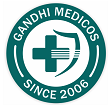Gefitinib Tablets (Geftinat): Uses, Benefits and Side Effects

Gefitinib Tablets (Geftinat): For Liver Cancer Patients:
Gefitinib Tablets also known as Geftinat, are a medication used for the treatment of certain types of lung cancer. It works by inhibiting the growth of cancer cells, thereby slowing down the progression of the disease. In this article, we will discuss the uses, benefits, and side effects of this medicine.
Uses of Gefitinib Tablets (Geftinat):
Non-Small Cell Lung Cancer (NSCLC): Gefitinib is prescribed for patients with NSCLC that have specific mutations in the epidermal growth factor receptor (EGFR) gene. It is particularly effective in treating EGFR mutation-positive NSCLC, where it helps to slow down the progression of the disease.

Benefits of Gefitinib Tablets:
- Targeted Treatment: Gefitinib Tablets are a targeted medicine that selectively inhibits specific molecular pathways involved in cancer cell growth. By targeting EGFR mutations, it helps to disrupt the signaling pathways responsible for the uncontrolled growth and division of cancer cells.
- Improved Quality of Life: By slowing down the progression of NSCLC, Gefitinib can help improve symptoms and overall quality of life for patients. It may reduce symptoms such as coughing, breathlessness, and fatigue, allowing patients to better manage their daily activities.
- Extended Survival: In some cases, Gefitinib treatment has shown to extend the overall survival rate of patients with EGFR mutation-positive NSCLC. It can provide valuable additional months or years of life for individuals battling this aggressive form of lung cancer.
Side Effects of Gefitinib Tablets:
- Lung or Breathing Problems: Gefitinib can sometimes cause lung problems, including difficulty breathing, shortness of breath, and lung inflammation. It is important to promptly report any respiratory symptoms to a healthcare professional for evaluation.
- Liver Complications: Rare cases of severe liver damage have been reported with Gefitinib use. Monitoring liver function is crucial during treatment, and any signs of liver problems such as jaundice or abdominal pain should be immediately reported.
- Visualizing Difficulties: Gefitinib may cause changes in vision or eye-related problems. Inform your doctor if you experience any vision changes, eye pain, or other visual disturbances.

- Pregnancy and Breastfeeding: Gefitinib Tablets are not recommended for use during pregnancy or breastfeeding. It can harm the fetus or pass into breast milk, leading to adverse effects.
- Drug Interactions: Gefitinib may interact with certain medications, including proton pump inhibitors, antacids, or other medicines. It is essential to inform your healthcare provider about all medications you are taking to prevent any drug interactions.
- Gastrointestinal Effects: Gefitinib Tablets commonly causes diarrhea, which can usually be managed with appropriate measures. It is important to maintain hydration and consult with a healthcare professional if persistent or severe diarrhea occurs.
- Skin Reactions: Gefitinib treatment can lead to skin reactions such as rashes, dry skin, and itching. Notify your doctor if you experience any skin-related issues to determine the appropriate course of action.
- Nausea and Ulcers on the Mouth: Gefitinib Tabklets may cause nausea and, in some cases, ulcers on the mouth. If these side effects occur, your healthcare provider can suggest measures to alleviate symptoms and improve comfort.
- Loss of Appetite: Gefitinib treatment may result in a loss of appetite. It is important to maintain a healthy and balanced diet to support overall well-being during treatment.
Conclusion:
Gefitinib Tablets (Geftinat) have proven to be a valuable treatment option for patients with EGFR mutation-positive non-small cell lung cancer. By targeting specific molecular pathways, Gefitinib inhibits cancer cell growth and can provide benefits such as improved quality of life and extended survival. However, it is important to be aware of side effects associated with Gefitinib Tablets and promptly communicate any concerns or symptoms to healthcare professionals for appropriate management. Always consult with a medical professional before starting or altering any cancer treatment regimen.



 Anti Cancer Drugs
Anti Cancer Drugs Hepatitis C
Hepatitis C Meds for HIV
Meds for HIV Ayurvedic Medicine
Ayurvedic Medicine Transplant Medicine
Transplant Medicine Respiratory System
Respiratory System +91-9999064250 / 9811604424 / 9811604444
+91-9999064250 / 9811604424 / 9811604444
 8(800)100-47-90
8(800)100-47-90
